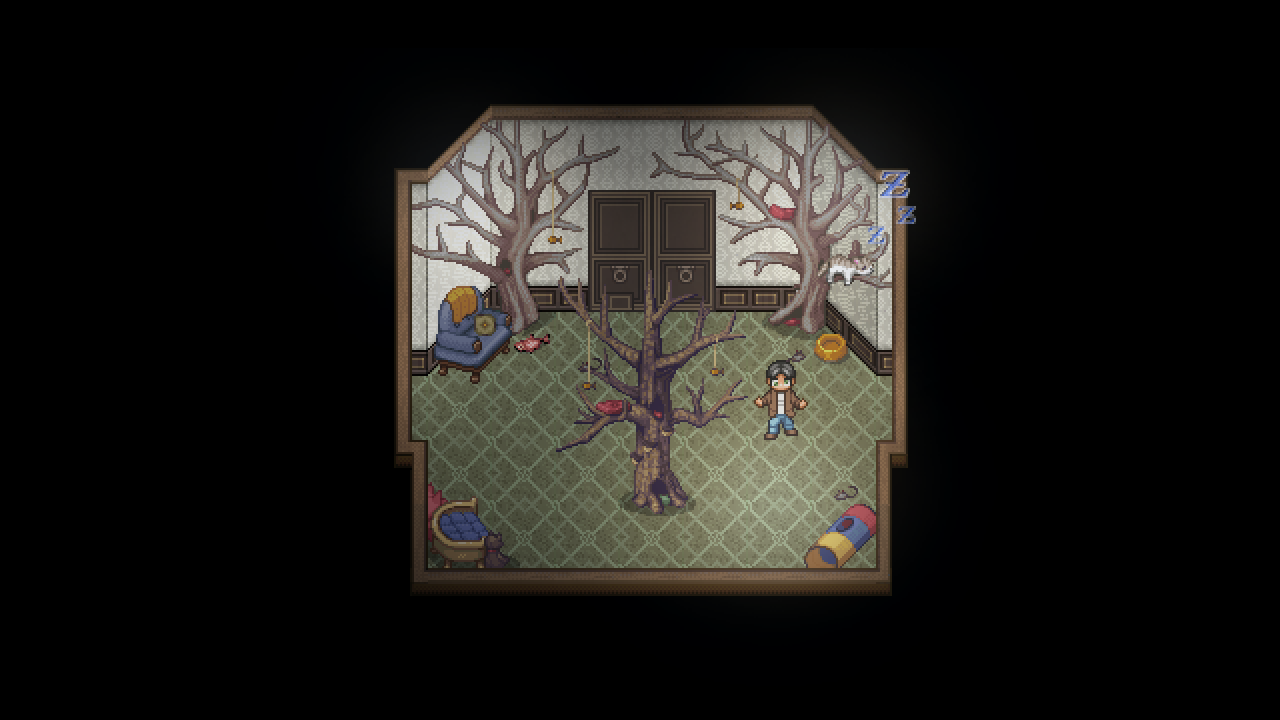Kan Gao and his team at Freebird Games have somehow created arguably the best storytelling gaming has ever seen–with RPG Maker. Well, okay, Impostor Factory is made with RPG Maker XP, so clearly they’ve moved into the modern age of game engines. All jokes aside, To the Moon has changed lives–including my own. Finding Paradise followed in stride quite well, earning an Editor’s Choice award from me. Impostor Factory meets the standard with an emotional journey that philosophizes about life with a few laughs sprinkled in.
Freebird Games’ works have always been a powerful marriage of direction, sprite design, music, pacing, and writing. What most people see is the writing, with everything else serving as a complementary backdrop. We’re unaware of what exactly makes these games so powerful. One could reference the enchanting melodies, the precision of the camera during moving scenes, or expertly crafted animations each sprite boasts, but none of these work in isolation. In truth, the writing itself isn’t anything terribly sophisticated. Impostor Factory doesn’t offer tomes of lore, dramatic tales of mountain climbers overcoming adversity during a winter storm, or humble peasants turned heroes as they battle an ancient evil. This tale is just about charting a course through life like anyone else, albeit with a touch of fantastical sci-fi.
Our lead, Quincy, finds himself with an enigmatic invitation to a mansion. While there, he meets several accomplished individuals. Over the course of his stay, he discovers his hosts mysteriously murdered. Amidst the panic, he washes his hands, and then meets his hosts happily alive and carrying on while waiting for the guests to arrive. How can this be?
Of course, Impostor Factory isn’t just a murder mystery. We get to learn about Quincy and his time with someone special. While the time loop murders grow invisible in the rearview mirror, further mysteries reveal themselves surrounding his life and fate. Though, Impostor Factory is more than just a mysterious romance: it demands the player ask questions about their own life, how to face–and embrace–challenges, and what a satisfying life looks like.

Freebird Games don’t preach or get on a soapbox, either. Instead, we’re invited to ask these questions without being confronted. Impostor Factory is a reflective experience in which we fall in love with our charming protagonists and see ourselves in them through laughter and tears. We wonder–what would I do? I remember doing something like that. I hope the characters do x. And in that hope, we learn about ourselves. Life isn’t perfect. But what if it could be?
That’s been the theme of the To the Moon series. Sigmund Corp., for those unfamiliar, is a company that can help dying people find peace and happiness as they depart the world by altering memories using a fantastic machine. In doing so, we’ve asked ourselves time and again: what is the perfect life? Is it one without challenges? How important are memories?
Introspection aside, Impostor Factory can be enjoyed on its face. Here is a touching tale of two people who find each other, grow together, face challenges, and have to make tough decisions. It’s as heartbreaking as it is beautiful. To assist in this journey, we have concise dialogue where every word feels labored over. At no point did I ever feel like my time was being wasted or an exchange frivolous. Each music track seamlessly matches the scene it shares, but if one takes a moment to listen, we are warmed by a similar style of music to the previous games–primarily with the gentle tapping of piano keys. Most of the camerawork is done as players move around, but key scenes take the reins out of the player’s hands to do some panning here and there. While artistically similar to 16-bit era figures, the characters come to life with outstanding animations that are as endearing as they are precise; if the dialogue doesn’t scream personality, the cute smiles and poses sure will.

As I prepared for this review, I waffled about how much of a critic to be. With something as artistic and beautiful as Impostor Factory, do I really have to lay criticisms? I do feel it’s my responsibility–and I’m going to–but I want to state that whatever grievances I make are minimal, and do not significantly detract from the fact that Impostor Factory is a must-play, especially for anyone who’s enjoyed the series thus far.
One area of weakness I’ve had the slightest problem with since the first game are the controls. Walking around rooms can sometimes be a minor challenge, which is odd because the game feels and looks intuitively simple to navigate. For those who like to explore, the edges can feel rough with seemingly invisible walls and areas that look like a secondary path to get from point A to point B, but they aren’t. The visuals, while charming and incredibly detailed, can initially feel archaic and will likely inhibit a rare few individuals from finding immersion. For me, I was initially turned off from the visuals, but within five minutes, I found the aesthetic preferable and fitting. While it may be derivative to say so, the music, while excellent, doesn’t meet the standard of the first two games. Laura Shigihara (vocals) is indeed missing, and while this was an artistic decision made by the creator, her lack of presence is keenly felt, given her contributions on To the Moon and Finding Paradise. Finally, Impostor Factory lacks the “punch” the first and second games boasted, and felt the slightest bit flat at the end.
Now that that ugliness is over, please go buy Impostor Factory, support Freebird Games, and enrich your life with art. Writing a review for games like this feels bizarre to me, because synthesizing the work down to a number honestly feels wrong. It’s akin to going into an art gallery and scoring each painting or sculpture, and while that seems like I’m laying the praise on a bit thick, I genuinely feel this way. Whenever I’ve been in a slump or felt lost, a good book or movie with something to say has always been the best prescription. Impostor Factory can be that antidote for those who need it. Thank you, Kan, and thank you, Freebird Games. You’ve created an outstanding trilogy, and I absolutely, unequivocally, cannot wait to see what you do next. You have a supporter for life.



